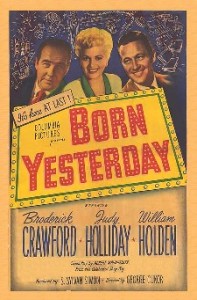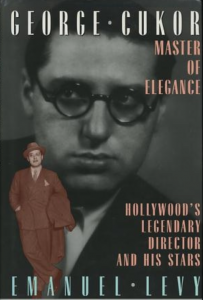In April 1950, Harry Cohn, head of Columbia, assigned George Cukor to direct the studio’s hottest property, “Born Yesterday.” Though not the first choice, getting “Born Yesterday” was an achievement for Cukor–it was a prestige movie, based on a prestige literary source.
All the studios in town had been after the play that Garson Kanin wrote and directed on Broadway. Making one of its biggest deals, Columbia purchased the play for $1 million in 1948, but the project was put on the shelf for months because of casting problems. Harry Cohn was waiting for his then biggest star, Rita Hayworth, Aly Kahn’s new wife, to make up her mind; in the end, Hayworth turned it down.
The studio then made it official that, as Cukor wished, Judy Holliday would play Billie Dawn. Kanin had written the play for Jean Arthur, for whom he made many concessions, but the insecure Jean Arthur withdrew during rehearsals. Holliday, who was asked to learn the role in three days, scored a huge success, playing Billie Dawn for 4 years and 1643 performances.
My Biography of George Cukor
Before Cukor came aboard, Cohn’s maladroit handling of the situation alienated everybody involved with the New York production. Cohn riled up Paul Douglas, who played Brock, the junk dealer, so much that the actor would have nothing to do with the movie.
Instead, the part was assigned to Broderick Crawford, who recently won the Best Actor Oscar for “All the King’s Men.” Crawford benefited from the casting and 1949-1950 became the best years of his career.
All the King’s Men Review
https://emanuellevy.com/review/featured-review/oscar-history-best-picture-all-the-kings-men-1949/
Crawford Vs. Douglas
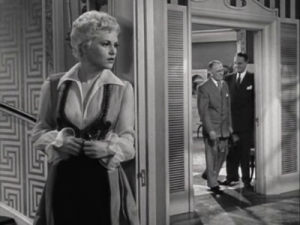 Crawford was a better actor than Douglas, but he lacked the latter’s sex appeal. Both actors were tough, but when Douglas punched Holliday it was at once painful and erotic. Crawford, in contrast, punched her like a policeman, and the two didn’t generate any sexual tension. On stage, Holliday and Douglas worked so well together that the audience didn’t really want her to go back to the journalist, who was a stuffed shirt. But because of the casting, in the film, William Holden’s journalist was perceived as the sympathetic-romantic role.
Crawford was a better actor than Douglas, but he lacked the latter’s sex appeal. Both actors were tough, but when Douglas punched Holliday it was at once painful and erotic. Crawford, in contrast, punched her like a policeman, and the two didn’t generate any sexual tension. On stage, Holliday and Douglas worked so well together that the audience didn’t really want her to go back to the journalist, who was a stuffed shirt. But because of the casting, in the film, William Holden’s journalist was perceived as the sympathetic-romantic role.Cohn was polite with Cukor, and the director did his best to keep him that way. He was sorry that Kanin had his back up at Cohn, and would have nothing to do with the final script. Cukor now hoped that “les freres Epstein,” the bright Julius and Philip, who had scripted the Oscar-winning “Casablanca,” would produce a respectable enough script. But, alas, he was absolutely wrong.
When Cukor was given Epsteins’ draft, it was significantly altered from the original version. “To spend a million dollars and throw out what’s good” Cukor told Cohn, “If you’re married to this script, I really can’t do it, there were some awfully good things that you’ve thrown out arbitrarily.” A tough businessman, Cohn paid a lot of money for the script and wouldn’t spend anymore. He agreed with Cukor for Kanin to do a rewrite, if he wasn’t paid more money and didn’t get screen credit (which went to Albert Mannheimer). “These were the bad Hollywood days,” Cukor later told Gavin Lambert, “when everyone was supposed to be cynical and corrupt, and you never lent yourself to a project just because you believed in it.”
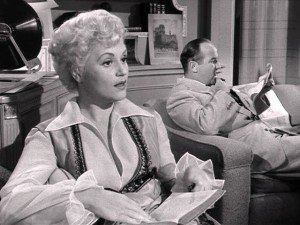 To Cukor’s dismay, Columbia treated the project as if it were a dreary play that “just happened to limp along” for four years on Broadway. But Cukor didn’t feel bad about burdening Kanin with the rewrite–he really needed his support. He knew that Kanin’s assistance might make the difference between success and disaster.
To Cukor’s dismay, Columbia treated the project as if it were a dreary play that “just happened to limp along” for four years on Broadway. But Cukor didn’t feel bad about burdening Kanin with the rewrite–he really needed his support. He knew that Kanin’s assistance might make the difference between success and disaster.Kanin, like Cukor, thought it was an error to stress the film’s plot. Though sound and tested, the plot was never the play’s strongest point. The way the Epsteins’ script dealt with Brock’s scheme, to sweep up all the scrap iron from the world, changed the play’s meaning. This is a point of growth for Brock–he’s becoming an international figure, but the Epsteins had emasculated the story. Cukor and Kanin suspected a certain kind of self-censorship was at work.
For Kanin, the substitutions and omissions (the script didn’t detail the scheme) were absolutely disastrous. To have rewritten the screenplay into a snide piece of mush-mouthery, was “tragic and a terrible whiff from the stench of cowardice.” Kanin also wondered why certain words were changed: “It used to be called fascism, now it’s called by other names” Does it mean communism If that’s the idea, why doesn’t the writer say so, instead of these mealy-mouthed inferences It was idiotic to make an intelligent man like Paul utter these words. It would be better to cut the whole damn thing.” Kanin thus begged Cukor to protect the play’s integrity at all costs.
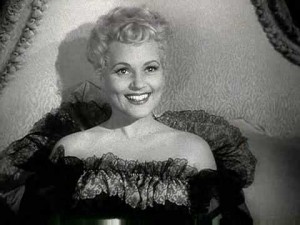 As a result of Cukor’s active intervention, the third draft, a combination of the play and old script, proved much better. Cukor perceived it as a “personal triumph over dark forces” that Kanin’s lines stayed. Boldly overriding all resistance, he reverted to the play’s original words, with all of Kanin’s suggestions incorporated into the final draft.
As a result of Cukor’s active intervention, the third draft, a combination of the play and old script, proved much better. Cukor perceived it as a “personal triumph over dark forces” that Kanin’s lines stayed. Boldly overriding all resistance, he reverted to the play’s original words, with all of Kanin’s suggestions incorporated into the final draft.Would you be innarested in a little action
Once the script was done, Columbia encountered nearly insurmountable difficulties in passing the scrutiny of the Code. Cukor was urged to take the greatest care in photographing Holliday’s dresses. The Code made it mandatory that the intimate parts of the body–specifically breasts–be fully covered. The Code also requested to avoid any suggestion that Billie is trying to get Paul into bed. They initially didn’t like Billie’s line, “Are you one of these talkers, or would you be innarested in a little action.”
They also didn’t like Billie’s speech, “If he don’t act friendly, I don’t act friendly. If you know what I mean.” But miraculously, with Cukor’s insistence, these lines remained intact. Cukor knew that audiences could accept the idea that innocence could be born afresh in a “fallen woman.” Billie was a “fallen woman,”, but her reaction when kissed by the young journalist is virginal, as if she’d never been kissed before. For the director, this was one of the film’s charming points: Billie was born yesterday, but she was also born again.
Cukor’s preparatory work for “Born Yesterday” was quite innovative. The actors rehearsed the screenplay for two weeks, then performed it before an audience drawn from studio employees. Cukor’s idea was to give the actors a chance to develop “dimensional characters,” and clock laugh values from audience reaction. It was a pre-preview of the film, even before the cameras began rolling.
Cukor held that if a scene is funny, there is no need to play about with it. When people complained, “that laugh overrode the line, I did not hear the next line,” Cukor’s answer remained the same, “Go and see the movie again.” But he did make some changes–when the laughter was long and loud, he added some visual detail.
Washington DC
To increase the film’s authenticity, Cukor went to Washington D.C. for locations. The city actually became a dramatic personage in the story. Observing tourists at the Lincoln Memorial, he noticed that sightseers would chew gum and give works of art a cursory glance, if any at all. In Hollywood movies, however, sightseers invariably stand in rapt attention. Avoiding these cliches, Cukor considered the outdoor scenes among his best efforts.
Judy Holliday was not a cinch for Cukor to make into a tantalizing tart. On stage, she wore five costumes, but in the film, Jean Louis designed thirteen elaborate creations. Cukor asked Louis to “characterize” the clothes, with obviously expensive and ornate clothes at the beginning, when Billie is dumb and acquisitive. However, as she acquires culture, her wardrobe becomes simpler and more elegant. Still, Holliday made a great entrance with a corsage hanging behind her right ear; it looked like a displaced bunch of grapes.
Like “Adam’s Rib,” which Cukor directed the tear before, “Born Yesterday” is an uneven film, with a hilarious opening, talky middle, and preachy finale. The critic Pauline Kael pointed out the film’s chief problem: as Billie gains in virtue, she diminishes in interest. Cinematically, Cukor continued his exploration of long takes–in Born Yesterday, the long silent gin game is possibly the film’s most brilliant sequence.
Judy Holliday’s Most Famous Role
Billie Dawn became Judy’s most famous role, even though her future role in Cukor’s comedy, “The Marrying Kind,” would be richer. With “Born Yesterday,” Holliday became an accomplished actress, for which Cukor took some credit. “It was all me,” he later observed, “My job was to see that she made all the points, but not too obviously.”
Taking advantage of Holiday’s unique voice, Cukor refused to let the sound department monkey around with it, insisting on an absolutely true recording. But the first time he heard her voice in the rushes seemed strange to him. “We just cut out some of the crud in her lower register,” a sound technician said. “You’ve also cut out the comedy and the heart,” Cukor dryly noted, “let’s go back to the original recording.”
While in New York, there was a press screening of Born Yesterday in Hollywood that created a big hoopla. Nothing but enthusiasm for the picture, and endless praise for Holliday, with the press predicting an Oscar for her. Cukor was not as sure as Cohn that Holliday would win the Oscar, but he knew she would be nominated and would give top contenders Gloria Swanson (Sunset Boulevard) and Bette Davis (All About Eve) a run for their money.
When the movie opened, Kanin was wonderfully generous, claiming it was even better than the play. It ought to be, Cukor held, “I swiped everything that I could from the New York production.”
At Oscar time, “Born Yesterday” was nominated for the top awards (Best Picture, Actress, Director). Cukor was relieved to be in New York during the Oscar race, planning to return after the “Academy dirt” was safely over. He couldn’t do again the big `clown laugh’ scene, with tears in his eyes, when he wouldn’t get the award for the fourth time–he was just too old for that.
Cukor listened to the Oscar ceremonies on the radio in a New York club, with two of the female nominees, Holliday and Gloria Swanson. Upon winning, the first thing Holliday wanted to do was to call her mother, but the press monopolized all the telephones. Cukor tried to get her a booth, but a reporter elbowed his way ahead of them. Cukor motioned that it was the actress who wished to call, but the reporter ignored them. With the rain pouring outside, he put his coat on Holliday’s shoulders and took her to a Chinese restaurant to make the call. Listening to her enthusiastic call, Cukor felt proud like her mother.
Cast
Billie Dawn (Judy Holliday)
Harry Brock (Broderick Crawford)
Paul Verrall (William Holden)
Jim Devery (Howard St. John)
Eddie (Frank Otto)
Norval Hedges (Larry Oliver)
Mrs. Hedges (Barbara Brown)
Sanborn (Grandon Rhodes)
Helen (Claire Carleton)
Bootblack (Smoki Whitfield)
